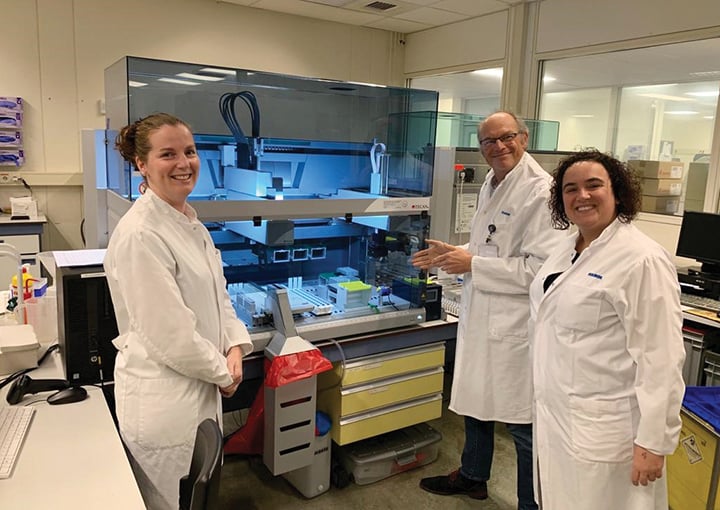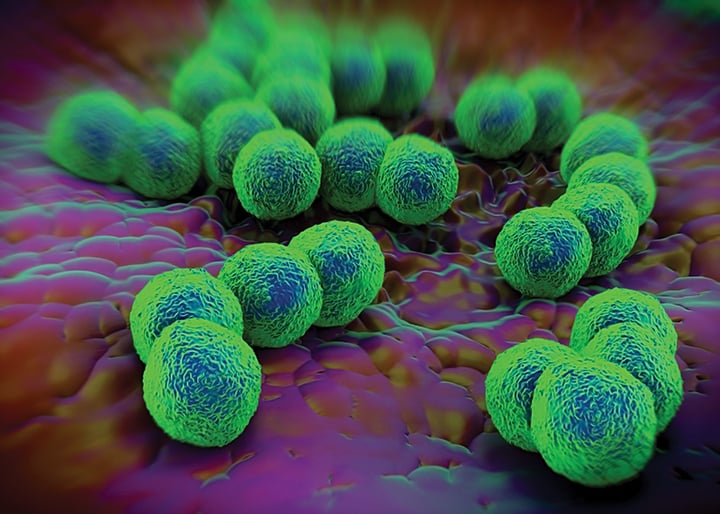Tecan uses cookies to improve our website. By continuing to browse our website, you accept our cookie policy.
Tecan uses cookies to improve our website. By continuing to browse our website, you accept our cookie policy.

Keywords:
DNA isolation and PCR set-up can be laborious and time consuming when performed manually. Dutch pathology and microbiology services provider PAMM has overcome this issue by automating its molecular testing protocols for sexually transmitted infections and gastrointestinal conditions, freeing up staff to perform other tasks.
PAMM is an independent, non-profit diagnostics laboratory company in the Netherlands. With facilities in Veldhoven and Eindhoven, it offers clinical microbiology and pathology services to general practitioners and five hospitals in the southeastern area of North Brabant province. The medical microbiology laboratory, based in Veldhoven, offers a broad range of bacteriology, virology and serology testing, working with blood, sputum, urine, feces, hair, biopsy and smear samples. With the growth of molecular diagnostics, PAMM now performs a large number of PCR-based tests for the identification of both sexually transmitted infections (STIs) – including Chlamydia trachomatis, Neisseria gonorrhoeae, Trichomonas vaginalis and Mycoplasma genitalium – and gastrointestinal (GI) disorders leading to vomiting, diarrhea or gastroenteritis, for example GI bacteria or parasites. Senior technician Inge Briels explained: “Typically, we receive almost 100 STI samples a day – 80 percent of them swabs, the rest urine – plus another 60 fecal samples. Isolating DNA from these samples, then setting up the subsequent PCR amplification, can be time consuming when performed manually.”

Lieke Donders (left), Jeroen van de Bovenkamp (center) and Inge Briels are reaping the benefits of automated genomics workflows
To streamline the workflow and free staff for other tasks, the laboratory has automated its isolation and PCR set-up protocols on two Freedom EVO® platforms. Inge continued: “Automation plays an important role in our laboratory and, as our molecular testing workload increased, it became obvious that we needed another workstation to perform this work. We already had one Freedom EVO platform in the lab and, after looking at different systems available, we decided that this was the best option for our intended use.”
Lieke Donders, also a senior technician, added: “Together with our clinical molecular biologist, Dr Jeroen van de Bovenkamp from the medical staff, we discussed our existing manual workflows with Tecan, and explained what we needed. We have developed a number of in-house PCR assays for both STI and GI samples, based on the CE-IVD compliant VERSANT® CT/GC DNA 1.0 Assay (kPCR) (Siemens), and the company was able to set up the workstation according to our exact needs, making it easy to transfer our manual protocols directly to the system.”
Inge continued: “We have been using the Freedom EVOs for DNA isolation and set-up of PCR reactions for around two years now. Generally, we use one of the workstations for the detection of STIs and the other for processing fecal samples, although we can switch between the platforms if necessary for maintenance or to accommodate additional samples, as the set-up is the same. The Freedom EVOs communicate with our LIMS via a middleware solution, automatically generating worklists to fully automate these protocols.”

“Sample preparation before DNA isolation is minimal,” said Lieke. “We just add 10 µl of fecal matter to 1 ml of lysis buffer – STI tubes simply need to be uncapped – and load the sample tubes onto the workdeck. All of the samples, as well as the PCR reagents, are barcoded, minimizing the risk of errors and providing full traceability. The platforms perform all the required pipetting tasks using an eight-channel Liquid Handling Arm™ with disposable filtered tips, and a Robotic Manipulator Arm™ moves the microplates to the correct station on the workdeck for the shaking, washing and incubation steps. All we have to do is load fresh PCR master mix onto the workdeck, start the run and walk away, and two hours later the extraction is complete and the plate is ready for PCR amplification.”
All we have to do is load fresh PCR master mix onto the workdeck, start the run and walk away, and two hours later the extraction is complete and the plate is ready for PCR amplification.
“Automating our DNA isolation and PCR protocols on the Freedom EVO has made a big difference to the laboratory, and we are thinking about automating other assays – such as vancomycin-resistant enterococci (VRE) and possibly hepatitis B and C – in the future, to free up even more staff time,” Inge concluded.
To find out more about Tecan’s genomics solutions, visit www.tecan.com/genomics
To learn more about PAMM, go to www.pamm.nl
Keywords: